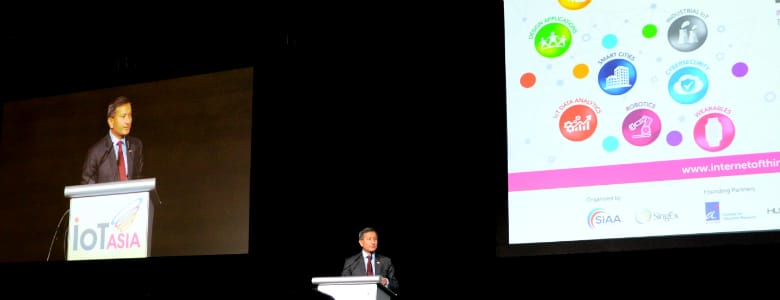Keeping up with the Robots

In 2016, an unlikely YouTube star emerged — one that couldn’t have cared less about how many views its video received.
With its ability to open doors, walk through snow, and right itself after being pushed over — all in uncannily humanoid fashion — Boston Dynamics’ Atlas robot captured the imagination of thousands of viewers.
Atlas was not a one-hit wonder to be shrugged off. Less than a year later, Boston Dynamics introduced Handle, a faster and more stable Atlas-on-wheels that can negotiate stairs and leapfrog over obstacles.
“If you think about it, [the robots’ capacity to learn] exceeds the pace at which a human baby, an infant, learns to walk, to talk and to communicate,” said Dr Vivian Balakrishnan, Minister for Foreign Affairs and Minister-in-Charge of Singapore’s Smart Nation initiative.
He was speaking on 29 March at the opening ceremony of the IoT Asia 2017 conference.
Such examples of technology remind us that we are living in the midst of a digital revolution, where programmes and robots are capable of acquiring skills faster than human beings, he said. Society, he added, cannot afford to ignore the huge implications that this will have for job security and wages
Building a new middle class
The digital revolution means that even middle-class, white collar work will be disrupted, said Dr Balakrishnan. But instead of adopting protectionist measures, a more appropriate response — and one that Singapore is taking — is to prepare well for these changes, he shared.
“We have decided that the most important political challenge is to prepare our people for this revolution, to make sure that we will be masters of technology and creators of new products and services, instead of trying in a futile way to compete with machines which can do things faster, cheaper and better than human beings,” he said.
“The challenge is to build a new middle class that has the skills, capabilities and abilities to harvest the fruits of these technologies, and thereby generate good jobs with good wages. That is really at the heart of what our Smart Nation mission is about.”
In line with this, Dr Balakrishnan announced that the Government Technology Agency of Singapore (GovTech) would be partnering with the National University of Singapore (NUS) to train 10,000 public servants in data science over the next five years.
On the cutting edge of data science
“It’s not just about the technology. It’s about making sure we are on the cutting edge, and that we can use data science to improve the way we measure performance, package new services, and deliver and improve government services,” he said.
Initiatives such as this should not be limited to the public sector.
The government, for example, works with the manufacturing sector and with small and medium enterprises to help them build digital capabilities that will help them compete on a global stage.
“Every company and every employer needs to ask themselves whether their people — who are their most precious asset — are up to date, and if they have the skills and the ability to ride this digital revolution,” he said.
Dr Balakrishnan added that the government intends to accelerate the development of national technology platforms such as the Smart Nation Platform, which is the infrastructure backbone needed to support the Internet of Things (IoT).
Because the IoT industry has yet to adopt a set of standards, such platforms would need to be built in a manner that would allow them to remain relevant even if technologies or vendors change, he said.
“The lack of consensus or even the current fragmentation of the market is not an excuse for paralysis,” he added.
Universal digital literacy
The opening ceremony also featured a panel discussion involving Dr Balakrishnan; Mr Jordi Puigneró i Ferrer, Secretary for Telecommunications, Cybersecurity and Digital Society of the Government of Catalonia, Spain; and Mr Christopher Pook, Regional Director for the Department for International Trade at the Singapore British High Commission.
Members of the audience submitted their questions for the panel via the conference app, and could also vote for which questions they most wanted to hear answered.
In response to a question about whether countries should put in place universal basic income for citizens displaced by robots and artificial intelligence, Dr Balakrishnan said that he believed that universal basic digital literacy was the answer instead.
“With universal basic digital literacy, you actually rescale, retool and equip citizens with the necessary wherewithal to deal with the opportunities that this revolution provides,” he said.
The point of teaching young students to code, for example, is not to turn them into coders. Instead, it is to help them understand computational thinking, as well as prepare them to understand both the potential and the limits of technology.
“Additional support for citizens is necessary, but that support should be directed at preparing people to compete, and at preparing them for their next job,” he concluded.
https://www.tech.gov.sg/media/technews/keeping-up-with-the-robots
